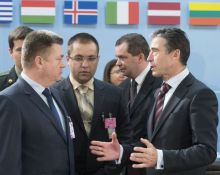Ukraineproclaimed its non-bloc status in 2010, yet official Kyiv intends to cooperate closer with NATO. This follows from the results of the meeting of NATO defense ministers in Brussels toward the end of last week. The Ukrainian delegation was led by the newly appointed Minister of Defense, Pavlo Lebediev.
According to The Day’s NATO source, the Ukrainian defense minister flew to Brussels to awaken cooperation between this country and the Alliance. NATO, however, did not seem to expect to hear anything new from Lebediev, except a more detailed description of the military reform in Ukraine.
NATO summits are held several times a year, on various levels ranging from heads of state or government to foreign and defense ministers. This time the defense ministers of 28 member countries gathered to discuss the situation in Afghanistan, considering that NATO plans to withdraw the ISAF before the end of 2014. The 100,333-strong ISAF includes 26 Ukrainian nationals. After the completion of ISAF mission NATO instructors will continue operating in Afghanistan, training security forces – and NATO clearly counts on professional help from Ukraine.
In Brussels, Secretary General Anders Fogh Rasmussen stressed on several occasions that Ukraine is a significant partner and a valuable contributor to NATO operations in Afghanistan and Kosovo; that he expected Ukraine to be NATO’s first partner to provide a frigate for anti-piracy Operation [Ocean Shield] in the Gulf of Aden and the Horn of Africa. He also reiterated the values on which the cooperation between Kyiv and Brussels rests, including democratic principles, on the rule of law and human rights. NATO member countries have made clear their concern about selective justice and political persecution in Ukraine. NATO is closely following developments in Ukraine because the Alliance wants to cooperate with a strong Ukraine.
An anonymous NATO official told The Day that Ukraine’s adherence to democratic principles will have an impact on Kyiv-Brussels political cooperation.
***
Many described the second day of the Brussels summit as “Ukrainian,” because a sitting of the NATO-Ukraine Commission was scheduled for that date. A similar meeting dates back to June 2010 when Mykhailo Yezhel was Minister of Defense. Lebediev’s visit to Brussels can, therefore, be regarded as a sequel to previous bilateral contacts, as an effort to re-establish links. He was present during the commission’s sittings, met with the secretary general, took part in the discussion of the situation in Afghanistan, and met with his counterparts from member countries.
Lebediev and Rasmussen signed documents regarding frigate Hetman Sahaidachny’s participation in Operation Ocean Shield this September. Ukraine has thus become the first NATO partner to take part in this operation, as well as the first one among the member countries that has been involved in all NATO operations. After this mission, Sahaidachny will take part in the EU’s Operation Atalanta, to return to Ukraine toward the end of 2013. Defense Minister Lebediev says both missions will cost Ukraine’s budget 90 million hryvnias.
During a briefing for Ukrainian media people, Vice Admiral Ihor Kabanenko, First Deputy Chief of General Staff of the Armed Forces of Ukraine, said that Ukrainian troops (including a Marines company that will take part in the NATO exercise Steadfast Jazz in Poland this October, to take over active duty in 2014) will be part of NATO rapid deployment forces.
Regrettably, I couldn’t find out exactly how Pavlo Lebediev understands the important NATO concept of collective security, particularly in regard to countries that are joining this elite club. I asked whether he realized that every non-bloc country had to pay a dear price for this status. His answer amazed me and my colleagues. To begin with, the newly appointed minister spoke only Russian, waving his hands, even trying to crack a joke or two. The following is a transcript of his reply.
“My first question is who says this price is dear or cheap. Who? Give me that person’s full name. Don’t let us speculate on these issues, on what is expensive or inexpensive. When they start discussing contract service or any reform, speculations begin. Ukraine has NATO on the one hand and Russia, a nuclear power, on the other hand… This is number one. Number two: Is Ukraine going to attack any [country]? No, it isn’t. Number three: Ukraine has economic interests, economic conflicts and disputes. None of the experts, however, will say that a war will begin tomorrow or the day after. That’s my reply and it is meant to put an end to speculations on financial assessments. There is no truth there. That’s pure populism, nothing else. Considering that there is NATO on the one hand and Russia on the other, plus other factors, the main thing is to have the Armed Forces of Ukraine combat ready and effective…”
When asked by a journalist to assess NATO activities, the defense minister replied: “Considering that NATO has been in existence since 1946 [wrong: NATO was founded in 1949. – Ed.] and is still in one piece, it must have been doing something right – frankly speaking, this is my personal opinion, as a citizen. There are other criteria in regard to NATO, when it takes part in peacekeeping operations and saves human lives where military and civil conflicts are underway. I have a different opinion on Libya where a provocation took place, but I’m not dwelling on this subject…”
Before the sitting of the NATO-Ukraine Commission, Anders Fogh Rasmussen said Ukraine has formulated an ambitious and comprehensive program of reforms and modernization of its armed forces.
NATO and Ukrainians will have to wait for the Ministry of Defense and the Cabinet of Ministers of Ukraine to translate their ambitions into life. One thing is certain: Lebediev’s visit to Brussels has awakened cooperation between Ukraine and the Alliance.
This author would like to thank the NATO Information and Documentation Center in Ukraine for making his trip to Brussels possible.







